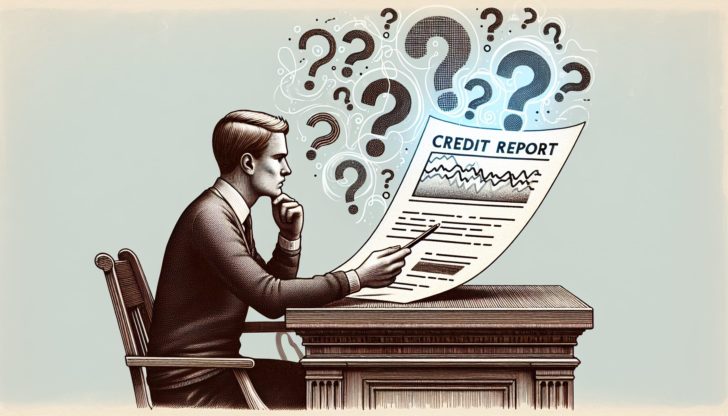Noticed an error on your credit report? Correcting it is crucial, and a credit report dispute is your way forward. This article breaks down the steps succinctly, from spotting inaccuracies to effectively submitting your dispute. Discover a straightforward path to ensure your credit report is an accurate reflection of your financial history.
Table of Contents
Key Takeaways
A credit report dispute is essential to correct inaccuracies that can negatively impact one’s ability to obtain credit, employment, or insurance, and should include a detailed written explanation and supporting documents.
Errors on credit reports, such as incorrect personal information or fraudulent activity, should be regularly checked for and can be addressed with the help of credit monitoring services and reviewing credit reports regularly.
Following a dispute submission, credit bureaus have 30 days to investigate and will provide written results and a free credit report if there are changes, while unresolved disputes can be escalated to additional resources like state attorneys general or the Consumer Financial Protection Bureau.
Understanding the Credit Report Dispute Process

Addressing errors on your credit report is more than a chore; it’s a necessity. Inaccurate information on your report can adversely affect your ability to obtain credit cards, loans, insurance, and even employment. So, how do you ensure your credit report accurately reflects your financial history?
A credit report dispute allows individuals to contest inaccuracies or incomplete information in their credit reports. The general dispute process involves checking your credit reports for errors and formally submitting a dispute to the credit bureaus. While the specifics may vary by bureau, the overall aim is to maintain your financial integrity.
Remember, your credit report isn’t just a record; it’s your financial reputation. To dispute credit report errors ensures that you’re represented accurately and fairly in the eyes of lenders and potential employers.
Identifying Errors on Your Credit Reports
Identifying errors in your credit reports can be as challenging as locating a needle in a haystack. It requires vigilance, regular checks, and a keen eye for detail. After all, the accuracy of your credit report affects not only your buying power but also employment opportunities, housing options, and insurance costs. Credit reporting plays a crucial role in maintaining the integrity of your financial profile.
It would be beneficial to consider enrollment in credit monitoring services provided by a credit reporting company. They offer continuous oversight and alert you to changes that may affect your credit score. By regularly reviewing your credit reports and keeping tabs on your credit score, you can catch and address identity theft early and ensure that all listed items on your credit reports are accurate and pertinent to you.
Types of Common Credit Report Errors
Despite our meticulous attention, common errors in our credit reports can still be overlooked. Incorrect or incomplete account information, fraudulent activity, and outdated personal data can slip through the cracks and negatively impact our credit scores. To avoid these issues, it’s essential to regularly review your credit report information.
It’s not uncommon to find identity mistakes like incorrect names, phone numbers, or addresses on your credit reports. Sometimes, accounts may be incorrectly attributed to an individual due to similarities in names or due to identity theft. Data management errors may also lead to incorrect current balances or credit limits displayed on your credit report.
Learn more, visit What are common credit report errors that I should look for on my credit report?
Initiating a Dispute with the Credit Bureau

Having identified an error in your credit report, the next step is to take action. Disputes can be submitted to the credit bureau online, by mail, or by phone, depending on what’s most convenient for you. However, the method of submission isn’t the only thing to consider when initiating a dispute.
Filing the dispute with each bureau reporting the mistake is a crucial step when disputing errors. Include a detailed written explanation along with copies of any supporting documents to facilitate a quicker review and resolution process by the credit bureau. Remember, simply initiating a dispute isn’t enough. You must provide solid evidence to support your claims.
Crafting an Effective Dispute Letter
The dispute letter serves as your initial defense against credit report errors. It should include your complete name and address, each mistake you want fixed with explanations, and copies of supporting documents. Providing complete personal identification ensures the credit bureau can easily verify your identity and properly address your claims.
Identifying each error clearly and providing detailed explanations quickens the review and resolution process. Including copies of supporting documents serves as evidence for your claim and helps establish the validity of the disputed information.
Sending Your Dispute via Certified Mail
The mode of sending your dispute letter holds equal importance as its content. To ensure a verifiable record of correspondence, it’s recommended to send your dispute letters via certified mail with a return receipt. This not only confirms the credit bureau’s receipt of your correspondence but also provides you with peace of mind knowing your dispute has reached its destination.
The Investigation Phase: What Happens Next?
Upon initiating your dispute, the credit bureau is allotted a maximum of 30 days to conclude the investigation. This period may seem long, but remember, it’s a necessary step to ensure that your dispute is thoroughly reviewed and addressed.
During this phase, the three major credit bureaus, also known as credit reporting agency or credit reporting bureau, are obligated to:
Investigate your disputes
Report the results back to you within five days after the investigation
Provide a written copy of the investigation results
Provide a free copy of your credit report if any changes are made.
It’s not just the credit bureaus that take action during this phase. Equifax Information Services LLC, along with other information furnishers and credit reporting companies, also have a role to play. They are required to:
Investigate and correct inaccurate reporting
Notify all credit bureaus to correct their records
Communicate with you and the credit bureaus about any updates or changes after the investigation.
Analyzing the Dispute Results
Upon completion of the investigation, the credit bureau directs the results to you in written form, usually within a month of lodging the dispute. If changes are made, they will provide a free updated credit report. This report will reflect the current state of your credit health and give you a clear understanding of where you stand.
However, not all disputes result in resolution. If your dispute is found to be frivolous or irrelevant, or if it remains unresolved, you will be notified with a reason for the decision. In such cases, you have the right to add a statement to your credit file. Remember, your voice matters, and you have the right to be heard.
If the Dispute is Unresolved: Additional Measures

In case your dispute remains unresolved, remember not to lose hope. There are additional resources you can tap into. For instance, state attorneys general can be a resource for submitting complaints about unresolved credit disputes, as some states offer additional consumer protections.
Moreover, servicemembers experiencing unresolved credit disputes can seek assistance from their legal assistance office. Don’t hesitate to reach out to these resources if you’re struggling to resolve your dispute.
In addition, the Consumer Financial Protection Bureau is available to assist you. Usually, after filing a complaint, you can expect a response within 15 days. This time frame may vary depending on the situation. Remember, you’re not alone in this journey. There are numerous resources available to help you navigate the dispute process. Some of these resources include:
Consumer advocacy organizations
Legal aid services
Credit counseling agencies
Online forums and communities
Utilize these resources to get the support and guidance you need during the dispute process, including how to dispute online.
Protecting Your Credit Post-Dispute
Successfully challenging errors in your credit report marks a victory, but it does not signify the end of the journey. Protecting your credit post-dispute is just as crucial as the dispute process itself. Regularly review your credit reports to ensure that inaccuracies are removed and that any disputed information is properly marked.
Take additional security measures to safeguard your credit health. Here are some steps you can take:
Implement multi-factor authorization for online applications.
Set strong unique passwords for all online accounts.
Keep your physical credit cards secure.
By being proactive and vigilant, you can maintain your credit health and secure your financial future with the right credit card company.
Summary
In conclusion, maintaining the accuracy of your credit report is paramount to your financial health. From spotting errors to initiating disputes and protecting your credit post-dispute, every step is crucial. It’s not just about correcting mistakes; it’s about safeguarding your financial reputation. So take action, be proactive, and remember, your credit health is in your hands.
Frequently Asked Questions
Why is it important to dispute errors on my credit report?
Disputing errors on your credit report is important because inaccuracies can impact your access to credit, insurance, and employment opportunities. It’s crucial to maintain an accurate credit history for better financial outcomes.
What types of errors can I find on my credit report?
You can find various types of errors on your credit report, such as incorrect account information, fraudulent activity, and outdated personal data, all of which can negatively affect your credit scores.
How can I submit a dispute to a credit bureau?
You can submit a dispute to a credit bureau online, by mail, or by phone, ensuring you file the dispute with each bureau reporting the mistake and provide a detailed written explanation with supporting documents.
What happens after I submit a dispute?
After submitting a dispute, the credit bureau takes up to 30 days to complete an investigation. You can track the status of your dispute online with the confirmation number provided.
What if my dispute is unresolved?
If your dispute remains unresolved, you can seek assistance from resources such as your state attorney general, the Consumer Financial Protection Bureau, or the legal assistance office for servicemembers.









